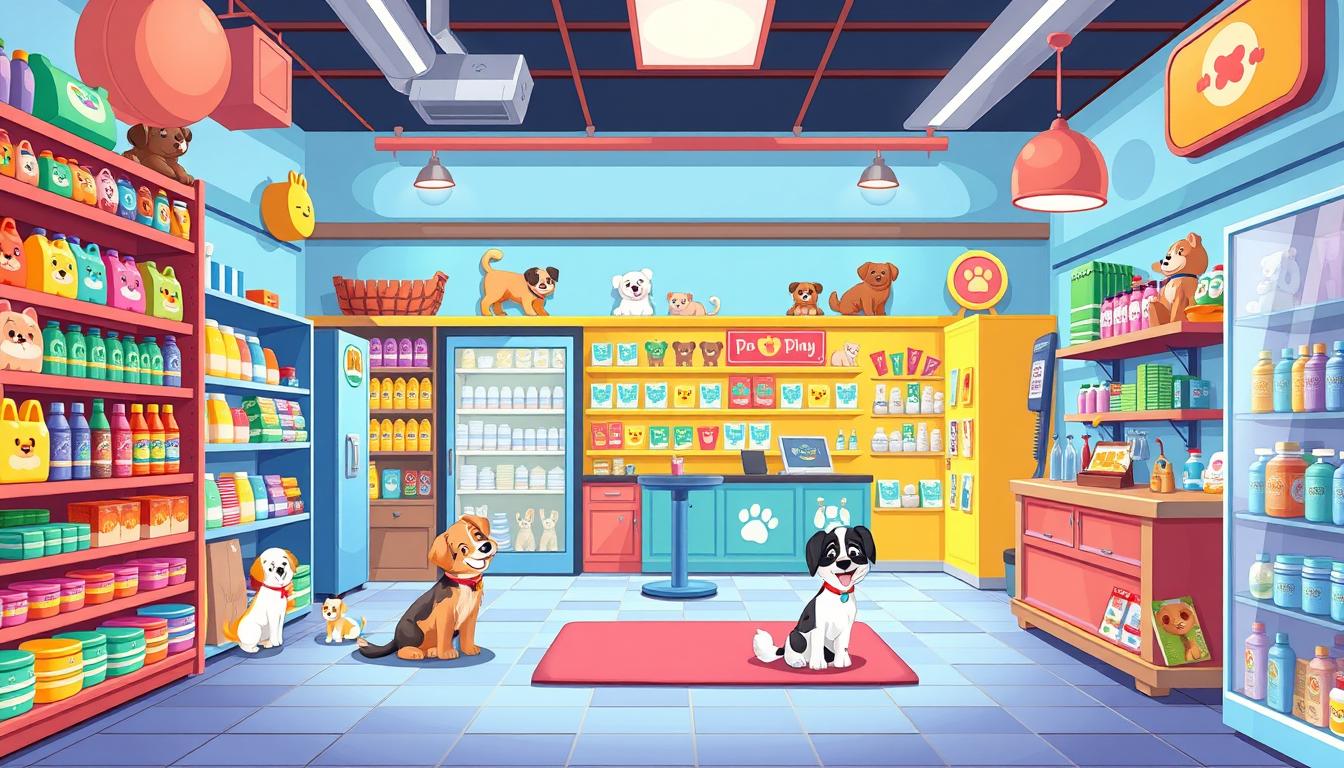How can your pet store stand out in a crowded market where 66% of U.S. households own pets? The pet industry is booming, making $150 billion a year. It’s crucial to use marketing strategies that go beyond just selling. You need to engage and keep customers coming back.
Know your audience and mix digital marketing, community events, and creative branding. This way, you can turn one-time visitors into loyal customers. By exploring different ways to promote your store, you can grow and shine in this lively industry.
Use social media and create compelling email campaigns to boost your store’s success. Also, adding search engine optimization can make your store more visible online. This helps attract new customers and keep the ones you have.
Key Takeaways
- Pet stores can leverage community events to increase awareness and foot traffic.
- Effective use of social media can help showcase products and engage directly with customers.
- Email marketing fosters long-term customer relationships, leading to repeat business.
- SEO techniques are essential for enhancing online visibility and attracting web traffic.
- Loyalty programs encourage repeat purchases, boosting customer retention.
Understanding Your Target Audience
Knowing your target audience is key for a good marketing plan in the pet industry. It helps businesses make products and ads that fit. More homes are getting pets, especially among millennials and Gen Z, who see pets as family.
Identifying Pet Owner Demographics
The pet market is growing fast, thanks to more people getting pets. In 2022, 87 million U.S. homes had pets, up from 73 million in 2010. By 2024, this number is expected to hit 95 million, showing a big demand.
Knowing if people have dogs, cats, or both helps target ads better. Age, lifestyle, and how much they spend are important to look at when studying pet owners.
Analyzing Pet Care Trends
The pet care market is set to grow to over $368.88 billion by 2030. Seeing what pet owners want is key. In 2022, 45% of dog owners chose premium dog food, and more want eco-friendly stuff.
Businesses need to update their products to meet these needs. Knowing pet care trends helps market better.
Creating Customer Personas
Making customer personas helps brands make better ads. Millennials, who own 33% of pets, like stories and personal ads. Knowing how they like to get messages helps keep them interested.
Creating personas helps brands connect with different groups. This ensures products and ads meet what people want.
Building a Strong Brand Identity
Creating a strong brand identity is key for pet stores to stand out. Knowing what makes you unique helps you connect with your audience. This connection is crucial for building a loyal customer base.
Crafting Your Unique Selling Proposition
Your unique selling proposition (USP) is the heart of your brand. It highlights what sets you apart, like sustainability or local products. A strong USP attracts and keeps customers who share your values.
Designing Eye-Catching Logo and Packaging
Visuals are important in pet store branding. A catchy logo and appealing packaging boost your brand’s visibility. Make sure your colors and images match your brand’s personality. Good packaging can make people feel something, strengthening their bond with your brand.
Developing a Consistent Brand Voice
Having a consistent brand voice is essential for clear communication. This voice should reflect your brand’s mission and values. Content that shows your unique perspective builds trust and makes you a go-to for pet owners. For more on building a personal brand, see this resource.
| Element | Importance | Tip |
|---|---|---|
| Unique Selling Proposition | Defines brand distinction | Highlight core values |
| Logo Design | Enhances visibility | Use bold colors |
| Brand Voice | Builds customer trust | Maintain consistency |
Leveraging Digital Marketing Strategies
In today’s world, online interactions are key to business success. For pet stores, using effective digital marketing is crucial. It helps them stand out, engage customers, and boost sales. An engaging website, smart social media use, and email marketing are key to growth.
Importance of an Engaging Website
An engaging website is essential for pet stores to succeed online. A good website attracts and keeps visitors interested, turning them into customers. Features like mobile optimization and fast loading times are important. They improve user experience and help your site show up in searches.
An engaging website is the base of a strong digital marketing plan. It lets pet stores showcase their products and connect with pet owners.
Utilizing Social Media Effectively
Social media is great for building a community and engaging with people. With 45% of the world using platforms like Facebook, pet stores need to be there. Sharing interesting content and offers can turn followers into loyal customers.
Knowing your audience helps tailor your content. Social media is a powerful tool for showing off products and building stronger connections. It’s key for increasing your brand’s visibility.
Email Marketing Best Practices
Email marketing is vital for keeping in touch with customers and encouraging them to come back. Personalized messages and targeted campaigns can really boost engagement. For example, segmenting your audience lets you send offers based on what they’ve bought before.
Creating catchy subject lines and visually appealing emails can make your campaigns more effective. Email marketing is a must-have for any successful digital strategy.
| Digital Strategy | Benefits | Key Features |
|---|---|---|
| Engaging Website | Attracts and retains customers | Mobile optimization, SEO, fast loading times |
| Social Media | Builds community and drives sales | Content sharing, customer engagement, promotions |
| Email Marketing | Encourages repeat business | Personalized messaging, targeted campaigns |
Using these digital marketing strategies helps pet stores reach more people and increase sales. For more tips on marketing, check out this resource. It offers valuable insights and tools for success.
Search Engine Optimization (SEO) Essentials
In the competitive world of e-commerce, especially for pet stores, SEO is key. It helps attract more customers and increase sales. A good SEO plan makes your online store more visible and draws in potential buyers.
Implementing Keyword Research
Starting with keyword research is vital for pet stores online. Knowing what pet owners search for can boost your website’s traffic. Long-tail keywords might not get as many searches but can lead to more sales.
Choosing keywords that are searched for often and are relevant is important. This way, you attract users looking for pet products. Using Revenue Boomers for SEO can help with this, making sure your keywords match what you offer.
On-Page SEO Techniques
On-page SEO is crucial for pet stores to rank better in search results. Making page titles, meta descriptions, and headers better can improve user experience. Also, linking pages together helps search engines find and index your content faster.
Fast website loading is also important. This can be achieved by compressing images, using browser caching, and reducing file sizes. A faster site performs better and can rank higher in search results.
Why Choose Revenue Boomers for SEO
Revenue Boomers is a top choice for pet stores wanting to grow online. They create custom SEO plans that fit the pet industry’s needs. Their approach includes effective keyword research and on-page optimization.
By building a strong backlink profile, pet store owners can increase their online authority. This leads to more visibility and targeted traffic.

Local Marketing Strategies for Pet Stores
In the competitive pet industry, local marketing is key to drawing in nearby customers. Pet store owners can tailor their strategies by understanding the local market. This helps boost brand visibility and build customer loyalty.
Effective local SEO tactics also improve online presence. This drives more foot traffic and boosts sales.
Analyzing Your Local Market
Before starting marketing, it’s crucial to analyze the local market. This means understanding who owns pets, knowing the competition, and finding what’s missing in services or products. These insights help tailor marketing to meet local pet owners’ needs.
Engaging with the Community
Pet stores should engage with the local community to build strong ties. Hosting adoption events, sponsoring animal shelters, or partnering with vets for health fairs are great ways to do this. These actions increase visibility and make the store a valued community member.
Being involved in community activities can greatly improve how customers see and feel about the store.
Leveraging Local SEO Tactics
Local SEO is vital for pet stores wanting to attract local customers. Key steps include optimizing Google My Business, using local keywords, and encouraging reviews. These actions help improve local search rankings and increase both online and in-store visits.
Creating Engaging Content
Engaging content is key for pet industry marketing success. Pet stores that focus on quality content draw more customers and build a strong community. Formats like blogs, videos, and user-generated content help build loyalty and brand recognition.
Blog Topics for Pet Owners
Creating pet care content through blogs is essential. It’s important to cover topics that pet owners find interesting. Consider writing about:
- Pet health tips and preventive care
- Seasonal care advice, including grooming and nutrition
- Innovative pet products worth trying
- Tips for organizing pet-themed events
North America leads the pet market with a 40.2% revenue share. This offers great chances to attract millennials and Gen Z, who love sharing pet moments online.
Videos and Tutorials for Pet Care
Videos are a great way to engage with your audience. Engaging content marketing can include product demos and pet grooming tutorials. High-quality visuals capture attention and help explain complex topics.
As 96% of Pinterest searchers are open to new ideas, optimizing videos for Pinterest can boost visibility and interaction.
User-Generated Content and Reviews
Using user-generated content builds trust and authenticity. Encouraging customers to share their stories and testimonials creates a community. Responding to comments and engaging on social media strengthens your connection with pet owners.
By planning your content and turning user experiences into engaging formats, you can make your marketing more effective.

Running Promotions and Loyalty Programs
Running promotions and loyalty programs can really help pet stores keep customers coming back. A good plan can draw in new faces and keep regulars coming back for more. It’s a win-win for everyone.
Designing Effective Promotions
Promotions for pet stores can really connect with customers. Discounts on favorite items or special deals can make people want to buy more. Using tools like Astro Offers makes it easy for everyone to enjoy these deals, building loyalty.
Implementing a Reward Program
Loyalty programs are a great way to thank repeat customers. Offering special discounts or early access to new items keeps them coming back. Plus, tracking what they buy helps tailor promotions, making them feel special.
Seasonal Campaigns for Increased Traffic
Seasonal campaigns can really get people excited about pet stores. Events like Neighborhood Pet Store Day on September 23, 2023, are perfect for connecting with the community. Tailoring promotions for holidays and pet-themed days can also boost visibility and social media engagement.
Working with local businesses, like shelters, can help reach more people. Hosting events like pet adoptions and costume contests can make a big difference. It’s a great way to get customers involved and coming back.
Measuring Marketing Success
To grow your pet store, it’s key to measure marketing success. You need to know which Key Performance Indicators (KPIs) to track. KPIs for pet stores include website traffic, conversion rates, and customer acquisition costs.
By watching these metrics, you can see how new strategies work. This helps ensure your marketing investments pay off.
Key Performance Indicators (KPIs) to Track
Using specific KPIs helps spot areas for improvement. Metrics like Customer Acquisition Cost (CAC) and Customer Lifetime Value (CLTV) offer valuable insights. For example, calculating Marketing ROI shows how much profit your campaigns make.
Setting baselines before starting new efforts helps measure success. This way, you can make better decisions for the future.
Tools for Analyzing Marketing Data
Using strong marketing analytics tools is crucial. Tools like Google Analytics help pet businesses track and analyze data. This makes it easier to tweak marketing plans based on real results.
By using data, pet store owners can improve their marketing. This boosts ROI and meets business goals. Advanced analytics help tackle challenges in analyzing different marketing channels, leading to ongoing improvement.
Adjusting Your Strategies Based on Results
Improving your pet business’s marketing ROI means always watching performance and adapting. Analyzing results helps find cost-effective channels and boost conversion rates. This improves profit margins.
Regular checks keep your marketing agile and competitive. This ensures your business stays successful in a changing market. For more growth tips, check out Revenue Boomers for tech and customer insight strategies.






